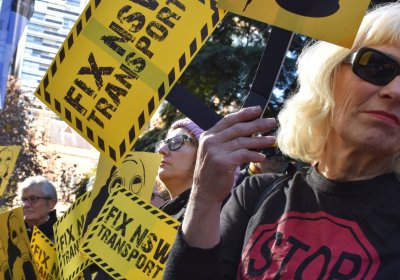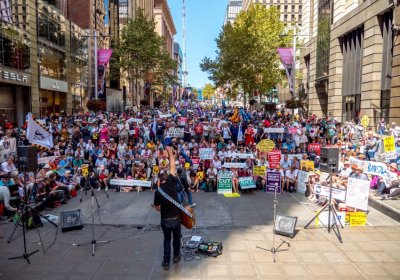A member of the audience at a recent public meeting in Merewether cheekily referred to Newcastle as being run by the Property Council, not the city council.
Public transport
Socialist groups and community activists of different stripes have come together under the banner of Victorian Socialists in one of the most ambitious bids in decades to get a socialist elected to state parliament. Green Left Weekly’s Jacob Andrewartha spoke to Stephen Jolly, Victorian Socialists’ lead candidate for the upper house Northern Metropolitan seat, about this initiative.
Sometimes I wonder if New South Wales transport minister Andrew Constance thinks he is a comedian.
New South Wales transport minister Andrew Constance should note the observation by Victor Hugo, the French novelist, that the worst thing a minister can do is have policies that upset people so much that they protest publicly and loudly about them.
On February 17, several thousand people from more than 30 community groups and unions marched through Sydney to demand the NSW state government fix the public transport system.
Andew Chuter, one of the organisers, told Green Left Weekly it was a “big achievement” to unite so many groups across NSW around this important issue.
“These sorts of campaigns tend to be quite localised, so getting people to see them as connected is quite significant. Some of those who took an active role in this rally had never been to a protest before.”
Several thousand people from about 30 community groups and trade unions joined forces in the first mass Fix NSW Transport march and rally through Sydney on February 17.
United in anger at the state Coalition government's private tollway frenzy, privatisation of public transport and developer scams parading as infrastructure plans, they called on the government to fix NSW roads and public transport.
International students in New South Wales face higher cost of living expenses than their counterparts in other states. This is one of the reasons students at Western Sydney University (WSU) have decided to launch a campaign calling on the state government to grant them public transport concessions.
“New South Wales is the only state where international students do not have the same rights as domestic students and cannot access the same facilities,” Daniele Fulvi told Green Left Weekly.
A toll road spiderweb is spreading across Sydney, with the cost of vehicle journeys set to rise substantially in coming years.
On the evening of May 22, more than 300 residents packed out Balmain Town Hall for a public meeting on the NSW Liberal government's proposed Western Harbour Tunnel toll road. This proposed 6km tunnel will connect to the fiercely contested WestConnex tunnel interchange in Rozelle going under the Balmain peninsula, then under Sydney Harbour before connecting to the Warringah Freeway.
The meeting was called by NSW Greens Balmain MP Jamie Parker who condemned the project as "yet another polluting, destructive, private tollway."
In a recent public discussion, campaigners against WestConnex — the huge motorway and tunnel project in Sydney — were challenged to sum up their case against WestConnex in three sentences. “Start with what the proponents of WestConnex say will be the benefit of the project then say what is wrong with it.”
There were half a dozen seasoned anti-WestConnex activists in the room and each came back with much more than three sentences.
Residents and supporters held a protest in Sydney Park on May 6, when contractors for the controversial $17 billion WestConnex tollway moved in to destroy more trees for the St Peters interchange.
The works are part of the project's push to remove more than 800 trees in Sydney Park, St Peters and Alexandria to allow widening of roads around the planned interchange.
Burrowing under the metropolis, winding through neighbourhoods and consuming green spaces, kilometres of bleak bitumen motorways provide the superstructure for the outdated combustion engine to travel further.
According to University of Technology Sydney, vehicles are traveling 25% further, which equates to 25% more pollutants and 25% more impact on communities and the environment. “Induced traffic” is the phenomenon that when roads are built people switch from public transport to roads and, in the age of climate change, roads congest, choke and gridlock Australian cities.
- Previous page
- Page 2
- Next page











